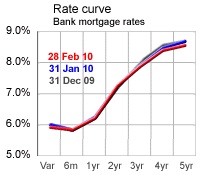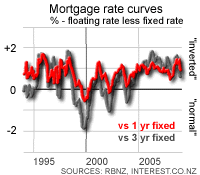 Announcements by Kiwibank, ASB, Westpac and BNZ in the last week indicate the retail mortgage rate curve is swivelling quickly towards being flat or positive for the first time in decades. This would be a major shift in the mortgage landscape in New Zealand where borrowers have become used to fixed rate mortgages always being cheaper than variable rate mortgages, unlike in Australia where most borrowers are on variable rates.
There are implications for monetary policy and for bank marketers, given the faster flow-through of any OCR changes to the economy and the removal of a 'churn' point for customers looking to refinance or refix mortgages.
The signs of a shift in borrower behaviour are already there. Borrowers are quickly voting with their feet in anticipation of variable rates falling to the same level or below the lowest fixed mortgage rates. The proportion of floating rating mortgages has jumped from 12.7% at the end of 2007 to 17.7% at the end of 2009 and bankers report many new mortgages or rolling fixed rate mortgages are being set at variable rates.
Our prediction is that most bank variable mortgage rates will either be at or below their fixed rates by the end of March, given the current rates of change in retail mortgage rates and the widely expected 50-100 basis point cut in the Official Cash Rate on March 12. The 'fighting' territory for banks is quickly migrating to the variable and 6 month rates, rather than the 6 month and 1 year rates of late last year and earlier this year, and the 2 and 3 year rates through 2004, 2005, 2006 and 2007.
Announcements by Kiwibank, ASB, Westpac and BNZ in the last week indicate the retail mortgage rate curve is swivelling quickly towards being flat or positive for the first time in decades. This would be a major shift in the mortgage landscape in New Zealand where borrowers have become used to fixed rate mortgages always being cheaper than variable rate mortgages, unlike in Australia where most borrowers are on variable rates.
There are implications for monetary policy and for bank marketers, given the faster flow-through of any OCR changes to the economy and the removal of a 'churn' point for customers looking to refinance or refix mortgages.
The signs of a shift in borrower behaviour are already there. Borrowers are quickly voting with their feet in anticipation of variable rates falling to the same level or below the lowest fixed mortgage rates. The proportion of floating rating mortgages has jumped from 12.7% at the end of 2007 to 17.7% at the end of 2009 and bankers report many new mortgages or rolling fixed rate mortgages are being set at variable rates.
Our prediction is that most bank variable mortgage rates will either be at or below their fixed rates by the end of March, given the current rates of change in retail mortgage rates and the widely expected 50-100 basis point cut in the Official Cash Rate on March 12. The 'fighting' territory for banks is quickly migrating to the variable and 6 month rates, rather than the 6 month and 1 year rates of late last year and earlier this year, and the 2 and 3 year rates through 2004, 2005, 2006 and 2007.
 Kiwibank upped the ante on Thursday, cutting its variable mortgage rate to 5.99%, which is the lowest variable rate in New Zealand since at least August 1965 and only 30 basis points above its 'fighting' 1 year rate of 5.69%. Westpac responded by cutting its variable mortgage rate by 40 basis points to 6.49%, while it cut its 6 month rate by 20 basis points to 5.79%. It left its one year rate unchanged at 5.79%.
BNZ's announcement that it had raised NZ$180 million through the issue of the first government guaranteed wholesale bank bond in New Zealand also highlighted the upcoming surge of funding costs set to flow through the system. The 5 year bonds were issued at 80 basis points above swaps. Once the 90 basis point fee is included, this means BNZ is paying around 5.7% for its 5 year money. Assuming 150 to 200 basis points of profit margin, that implies a sustainable mortgage rate of well over 7%, yet BNZ's current 5 year rate is 6.59%.
As noted by Westpac acting CEO Bruce McLachlan here, New Zealand's banks are gearing up to go out into global markets to refinance short term foreign debt with longer term guaranteed debt that could cost 250 basis points over swaps. This suggests that fixed mortgage rates are likely to stay at or above 6% for the forseeable future, particularly as swathes of government debt issues inevitably push up longer term interest rates globally.
Kiwibank's apparent reluctance in recent months to keep its term deposit rates high suggests it too is running out of appetite to grow its mortgage book at such rapid rates as seen through 2008, given the difficulties of raising fresh capital from a less politically accomodating shareholder and the indigestion it has seen servicing the current volumes.
Assuming a fall in the OCR to 2%, that would mean variable rates would approach 5%, taking them under 2,3,4 and 5 year fixed rate mortgages at 6% or higher. See all current rates here. The catalyst is likely to be the latest competitive moves coupled with the likely cut in the OCR on March 12. The swivelling of the mortgage rate curve from negative to flat or positive should be complete by the end of March.
* This article was first published yesterday in our daily subscription newsletter for the banking and finance industries. The email costs NZ$365 per annum and carries exclusive news and analysis for New Zealand banking and finance industry executives, regulators and investors. Sign up for a free trial here.
Kiwibank upped the ante on Thursday, cutting its variable mortgage rate to 5.99%, which is the lowest variable rate in New Zealand since at least August 1965 and only 30 basis points above its 'fighting' 1 year rate of 5.69%. Westpac responded by cutting its variable mortgage rate by 40 basis points to 6.49%, while it cut its 6 month rate by 20 basis points to 5.79%. It left its one year rate unchanged at 5.79%.
BNZ's announcement that it had raised NZ$180 million through the issue of the first government guaranteed wholesale bank bond in New Zealand also highlighted the upcoming surge of funding costs set to flow through the system. The 5 year bonds were issued at 80 basis points above swaps. Once the 90 basis point fee is included, this means BNZ is paying around 5.7% for its 5 year money. Assuming 150 to 200 basis points of profit margin, that implies a sustainable mortgage rate of well over 7%, yet BNZ's current 5 year rate is 6.59%.
As noted by Westpac acting CEO Bruce McLachlan here, New Zealand's banks are gearing up to go out into global markets to refinance short term foreign debt with longer term guaranteed debt that could cost 250 basis points over swaps. This suggests that fixed mortgage rates are likely to stay at or above 6% for the forseeable future, particularly as swathes of government debt issues inevitably push up longer term interest rates globally.
Kiwibank's apparent reluctance in recent months to keep its term deposit rates high suggests it too is running out of appetite to grow its mortgage book at such rapid rates as seen through 2008, given the difficulties of raising fresh capital from a less politically accomodating shareholder and the indigestion it has seen servicing the current volumes.
Assuming a fall in the OCR to 2%, that would mean variable rates would approach 5%, taking them under 2,3,4 and 5 year fixed rate mortgages at 6% or higher. See all current rates here. The catalyst is likely to be the latest competitive moves coupled with the likely cut in the OCR on March 12. The swivelling of the mortgage rate curve from negative to flat or positive should be complete by the end of March.
* This article was first published yesterday in our daily subscription newsletter for the banking and finance industries. The email costs NZ$365 per annum and carries exclusive news and analysis for New Zealand banking and finance industry executives, regulators and investors. Sign up for a free trial here.
Analysis: Why variable mortgage rates may fall below fixed rates within a month
Analysis: Why variable mortgage rates may fall below fixed rates within a month
20th Feb 09, 12:00pm
by

We welcome your comments below. If you are not already registered, please register to comment
Remember we welcome robust, respectful and insightful debate. We don't welcome abusive or defamatory comments and will de-register those repeatedly making such comments. Our current comment policy is here.